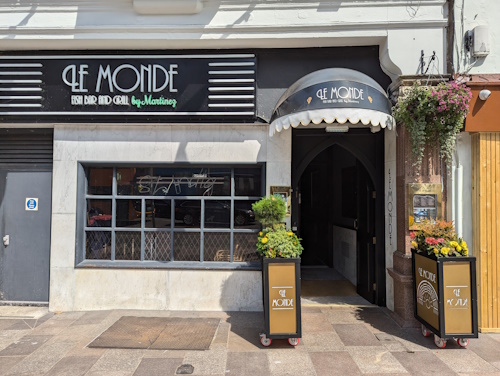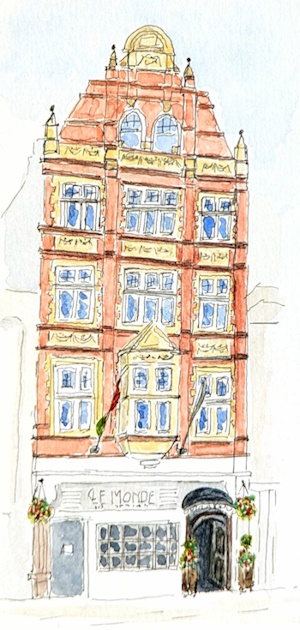 |
149. Dining at Le Monde
It was in the Autumn of 2018, four months after the death of Ms Keogh, my cherished companion of thirty-five years, when I met Ms Wang and Ms Hu while browsing in Troutmark Books, a shop of secondhand books. I was perusing the Folio Society collection. The two young Chinese women came in and tried to convince the clerk behind the register to submit to an interview and to allow them to film the three cramped floors of this narrow bookshop in Cardiff’s Castle Arcade. The clerk was rather adamant in his refusal. They left disappointed and visibly upset. I was quick to follow.
I introduced myself to Ms Wang and Ms Hu, apologizing for involving myself in their affairs. I was prepared to leave them in peace, but I offered to help by providing information about the bookshop, since the clerk was unwilling to assist.
First, I suggested they try again on the weekend when there would be a friendlier clerk. I also explained that I had written at length on the subject of that bookshop and would be happy to turn over to them all the information I had gathered.
We continued to walk together. They shared that they were in pursuit of a Master’s degree in International Journalism from the School of Journalism at Cardiff University. The interview was to satisfy Ms Wang’s thesis. Now they needed to come up with another idea.
The School of Journalism was not far. They were both familiar with City Centre. Nevertheless, I entertained them with details they had missed. I showed them the only place where the word “library” appeared on the handsome 19th century Old Library at the northern end of The Hayes. I explained whose stone head decorated the roof of the library, Athena. Then I explained who Athena was and what she symbolized.
When we reached the David Morgan Building, I explained how it used to be a very popular department store, well loved by the community that shopped there and the people who worked there. As they were curious, I invited them up to see what a flat in the converted building would be like. They trusted me enough to accept my offer.
Somewhere in that long conversation in my apartment, Ms Wang and Ms Hu decided they would make me, a recent widower, the subject of Ms Wang’s thesis. I was willing to share how much I missed Ms Keogh and how much it hurt. They intended to come back with a camera and sound equipment to interview me.
It required two interviews on different days. Ms Wang came with Ms Hu for the first interview. Ms Hu could not assist at the second interview. Ms Wang arrived with Ms Clarke. Ms Wang, having told Ms Clarke about me, she wanted to meet me.
Why me? Did they want to hear an expression of love that perhaps they’ve not heard before? Did they want to confront the suffering of loss and the anticipation of what could, or even likely, befall them some day? It is a simple formula, the greater the love, the greater the loss. I was a window for them into old age and bereavement. If I was different from other widows and widowers, maybe it was because I had labored to find the words to express it.
I also expressed ideas of the value of friendship, an investment that makes life’s hardships bearable. In comparison, wealth and power are trivial. That young, intelligent, attractive women could realize a friendship in a dilapidated old man boosted my pride, helping me to value myself.
While I am blind to it, Ms Wang was proof that I must have some merit to deserve her friendship. On other days, we continued to have long conversations during walks and all-night text messaging sessions. This is what I marveled at, that Ms Wang coming from Henan and myself coming from the Bronx, we understood and even agreed with each other’s beliefs. We were born 11,500 miles and 45 years apart, yet we discovered we shared the same humanity, the same values, the same grasp of reality. Our different cultures did not divide us. The impression I had is that unlike religious “truths” that emanate from a single source, we shared a system of values, a skepticism, had discovered critical thinking independently, virtuous qualities that might be rare, yet universal and independent of race or gender or nationality into which one happens to be born. It was gratifying to be understood and even liked for who I am.
Ms Wang and Ms Hu returned to China after graduating. Years passed. I would not see or hear from Ms Hu again, but Ms Wang stayed in touch.
Ms Wang, who graduated with a BA in Social Science from Shanghai University of Political Science and Law, was now seeking yet another degree in Film and Contemporary Audiovisual Media from the University of Groningen. The Netherlands are only a hop, skip, and jump away from Wales. Being near, Ms Wang returned to Cardiff to visit with Ms Clarke, who is now an editor and freelance writer, and the two of them came to visit me. It was only a brief visit for too short an evening.
Saint Mary Street was packed with whirling youth and riotous drunks. Music flooded the street from the numerous clubs and bars. The stumbling women in heels and men teeter-tottering were on the make or in search of ways to get high. Ms Wang and Ms Clarke were wary of our destination. You don’t expect a fine restaurant in such a debauched and turbulent area. At street level, it is just a door at the lower end of Saint Mary Street. The ground floor had the word “Shindig” in the window and belonged to the Be At One bar next door. I have never seen anyone in Shindig. The door to Le Monde presented an indication of class and was distinct from the rest of the street.
Stand back and you will see a tall and narrow building in a Dutch Renaissance style. You see the Victorian pride that went into what was formerly the Elliott’s Hotel and now preserved as a Grade II Listed building. We entered, traversed a short dark hallway, and climbed the narrow staircase to the next floor. There we entered a lively bistro, casual and a touch rustic, but with art deco table settings.
We waited until Moe, the maître d’, found us. I called him by his real name. He greeted me and my two guests enthusiastically. My favorite table, number two, was still occupied. The earlier diners had yet to vacate it. I would not accept a different table, so we were invited to wait at the bar, where I ordered Tio Pepe. They never seem to know they have it and it requires a search. Am I the only one drinking it?
At the bar, Ms Clarke and I had a minor argument about the future bill. At this stage, I could only get her to agree Ms Wang does not pay for anything because she is a student who has travelled far and was our guest.
Table two is in a hidden corner, the wall arrayed with the panels removed from wine crates bearing the names of the elixirs they once carried. The corner is reasonably quiet and conversations can be enjoyed.
Before our meals arrived, Ms Clarke and I took up the argument of the bill again. It was very important for me to pay on this occasion. I swore to her it was not because I’m a male or that I’m the oldest, and I promised her that she was welcomed to take me to dinner at another time, when I will only argue slightly to be courteous. But this was my evening. I had planned it. I admitted to Ms Clarke that I am not a rich man, but what good will the money be to me when I can no longer smell or taste the food, when the conversation is hard for me to hear, and when my eyes can no longer focus on the beautiful women keeping me company? I needed to spend it while I could still enjoy it. Then I ordered Champagne. In defense of my choice, it didn’t matter what we would eat, Champagne goes with everything.

Le Monde restaurant, Cardiff. Drawing by Glenys Stevens
![]()
Mr Bentzman will continue to report here regularly about
the events and concerns of his life. If you've any
comments or suggestions, he would be pleased to hear from you.
You can find his
several books at www.Bentzman.com.
Enshrined
Inside Me, his second collection of
essays, is now available to purchase.
